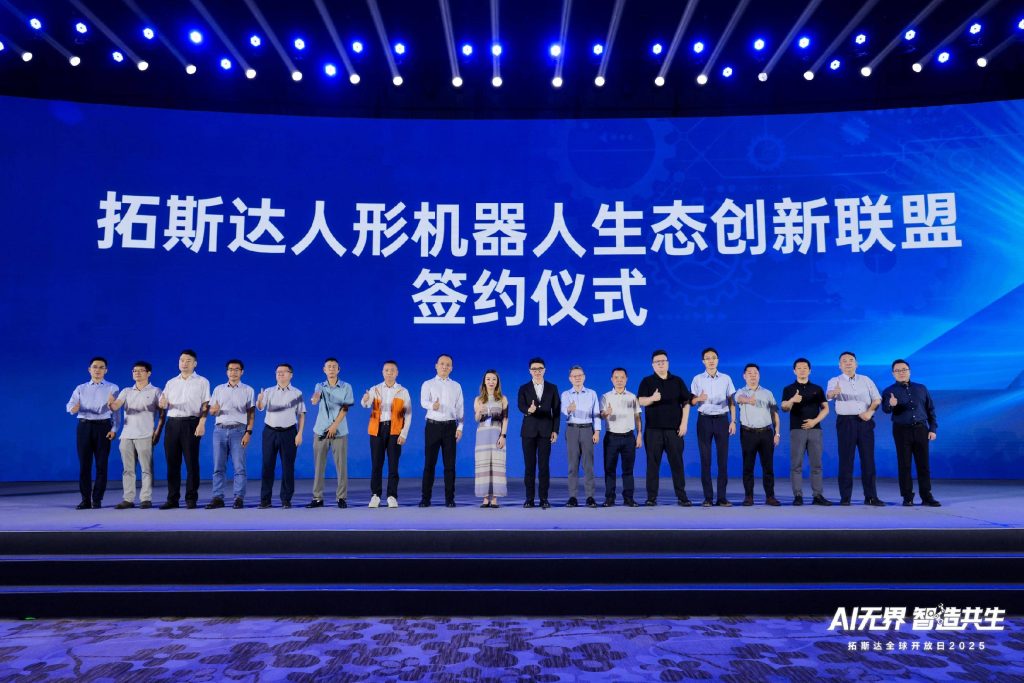On September 12, Guangdong Tuosida Technology Co., Ltd. (300607.SZ, hereinafter referred to as “Tuosida”) held a global open day event at its headquarters in Dongguan, where it unveiled its first embodied intelligent humanoid robot, “Xiao Tuo.” The company’s chairman, Wu Fengli, stated that while continuing to consolidate and expand its main business, the company will focus on high-end intelligent equipment and promote the application of artificial intelligence technology in manufacturing scenarios.
According to the Economic Observer reporter on site, “Xiao Tuo,” equipped with the Zhipu AI large model, possesses the ability to perform complex task reasoning using a thinking chain, enabling it to autonomously reason and make decisions for complex tasks in warehouse or factory environments. For example, by integrating a 3D camera with an AI visual inspection system, it can identify the yield of injection-molded parts in real time and autonomously complete processes such as tray loading, achieving full-process automation from inspection to operation. Thus, it is not only the first humanoid robot officially launched by Tuosida but also the first humanoid robot applied in the injection molding industry.
Furthermore, the manufacturing of “Xiao Tuo” has largely achieved “self-manufacturing”: its core components are processed using Evermi (a subsidiary of Tuosida) DMU400 five-axis CNC machine tools, and its key technologies such as servo control utilize the company’s developed mechanical end-effector vibration suppression control technology. According to Wang Zhicheng, the chief servo technology expert at Tuosida and a Ph.D. from the Shenyang Institute of Automation, Chinese Academy of Sciences, the innovative breakthrough in mechanical end-effector vibration suppression control technology not only demonstrates the company’s hard power in the high-end servo field but also provides critical technical support for the large-scale deployment of humanoid robots.
Chairman Wu Fengli stated at the event that since the company’s founding in 2007, starting from initial injection molding auxiliary machines and after 18 years of development, Tuosida has built a comprehensive solution service capability covering the entire injection molding chain from single machines to entire factories. With nearly 20 years of experience and numerous scenarios, the company has served over 15,000 clients across various sectors, including 3C, medical, automotive, and daily chemicals, providing a solid validation foundation and ample expansion space for the application of humanoid robots.
“Regarding when humanoid robots will commonly enter households, some predict around three years, while others estimate it will take at least ten years. We believe the duration is not important; what matters is whether you are prepared for it,” Wu Fengli stated. The company will continue to consolidate and expand its main business while focusing on high-end intelligent equipment and promoting the application of artificial intelligence technology in manufacturing scenarios. To this end, he proposed the company’s plan for the next 20 years: the first five years will focus on solidifying the foundation; the second five years will strengthen the equipment; and then, the next ten years will be dedicated to the physical world application of artificial intelligence.
During the launch event, Tuosida also announced the official establishment of the “Tuosida Humanoid Robot Ecological Innovation Alliance.” In this regard, Wu Fengli stated that the alliance aims to integrate resources from industry, academia, research, and enterprises to accelerate the large-scale application and innovative use of humanoid robots in diverse scenarios. “In the future, Tuosida’s humanoid robots will precisely solve practical application challenges through deep integration of processes and scenarios, ultimately building a sustainable business loop.”
Additionally, why was a wheeled robot introduced instead of a footed robot? In response, Tuosida’s secretary Xie Shimei told the Economic Observer reporter that as a company rooted in manufacturing, Tuosida’s evaluation criteria for products are cost and practicality. “Currently, in the industrial sector, especially in factories and workshops, the industry needs robots that can truly work, and clearly, wheeled robots are more practical and cost-effective in this regard.”返回搜狐,查看更多

